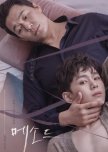
With this premise, the film is a pretty interesting concept, which can be watched on three levels: one, the play "Unchain" that is being rehearsed and performed within the film; two, the characters who must take up "method acting," let loose and assume the identities for the performance of this play; three, the real actors who are indeed doing "method acting" to assume the characters and in turn assume the same identities for the play. Which of the three is believable, and is it all acting - well, with regard to these questions: after watching the film, I can say that there is a missing element to "method acting," outside the control of actors but ultimately attributes to its success or failure. That element is what the film is about...you, the silent watcher, you with the choice as willing accomplice or critical call out in all this charade.
I can think of movies like Ocean's Eleven, Twelve, and others about some kind of heist or collaborative effort to "con" a stupefied audience, within and without the film. This is just like it. Do you believe the multi-level acting put on before you?
The funny part is that there's also a master and student relationship going on on the different levels. At the beginning, there's no interest whatsoever in any serious play. Then, one of them gets a signal from the other, almost like a prank - to see who can pull one over the other, maybe even outdo the other in this game - and suddenly there's now a contest, a battle of wills, to find the true master. One line says it all: "You are just another Walter, but I am the perfect Singer." On the pseudo-stage in the film, at least, I think we know who the victor, the master of the game, is.
On whether the real actors are convincing in their roles - I have to say it was a hot kiss that they shared, but take note that both their eyes were tightly closed, almost like they're afraid to look at each other. One wonders what they must be imagining, and two points off for not convincing me wholly.
Was this review helpful to you?
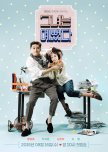
I really don’t want to “criticize” so much as to make suggestions to the plot in hopes that writers all over perhaps could take the frame of the story and add their brilliant touches for the masterpieces to come. There is a Chinese version already, garnering pretty good reviews, that I now must check out to see what their writers have done.
I agree with those that say the arc of the story finishes in 12 episodes, with the last four episodes mainly to wrap up everything and tie in all the loose ends. I wish that the arc would branch out further and use all that white space at the end to detail more instead the beauty spots of the story. For example, the friendship between Hye-Jin and Ha-Ri needs to have more hurdles to prove the strength of the girls’ soul sisterhood. Ha-Ri as a character needs more development because the way it is, she’s a major character of the story not to have more background. We know she’s well-off from her dad, but with a broken family due to a missing mother and a mean stepmother, Ha-Ri is ripe as a character for more complex internal interplay. Her sole anchor in life is her friendship with Hye-Jin but her relationship with her dad has poorly influenced her perception of men, to the point where she’s simply using most men for short-term flings, to be discarded once she becomes bored.
This is a person very useful as plot device to build bitter tension between the main couple only because she is quite capable of doing both good and evil. Her heart is different from Hye-Jin’s, whose inner beauty always shines through and very willing to suffer self-sacrifice for her friends and family. Ha-Ri should’ve been more daring, manipulative, greedier, all the time being confused over what she could potentially lose in order to gain the love of the one man so different from all the rest she’s had before. At what point does Ha-Ri realize that her need for this man is more a possessive act due to her miscast feelings about the sexes as the result of her upbringing? At what point does she recognize that she will lose her life-long friend just by standing in between them, keeping them apart, and thus breaking the hearts of two good-hearted people in love? These questions can be quite interesting to explore for the drama just by adding a few more calculated mishaps caused by our confused catalyst.
Then there’s the character of Sung-joon. I may upset a lot of star-gazers but PSJ looks simply too polished as a male model to play a character like Sung-joon, a chief editor of a fashion and style magazine, whose hobby is life sketching, and who has introverted pursuits like secretly drawing Hye-Jin biting on sea-weed at the seaside. PSJ looks too sharp and white-collar chic, gawky as a male specimen belonging in the photos of The Most rather than one of those in the shadows making it. It’s the difference between Shin-Hyuk as Editor Kim and Shin-Hyuk as Ten photographed in that last issue of the magazine. The two can be equally amazingly handsome but style-wise, PSJ does not behave like a frenetic, work-absorbed man bordering slight-autism whose awkward aloofness melts away next to the spunky, child-like Hye-Jin.
The role is difficult because in many romantic comedies, the male lead is put on a pedestal and his personality is pretty much written in stone to be unbendingly arrogant, tough but suave in order to attract and sustain female desire. Sung-joon is a hardcore romantic, who frequents art galleries and prizes a jigsaw puzzle because it’s a leftover from his childhood. It is difficult to get through to Sung-joon since he lives in his own world most of the times, people can’t read and understand him, and more importantly he doesn’t allow many to enter in that world - that is, unless it’s Hye-Jin. He has never forgotten his childhood sweetheart because she alone was able to break past that thickly woven layer of disassociation from reality having lost his mother at a young age.
The two of them together felt right as rain to him, and he seeks to recapture the spirit of their romantic friendship the same way he keeps listening to Carpenters’ bluebird song. That is why it is all the more compelling to him that a complete stranger, a new intern in office who looks nothing like the Hye-Jin he knew and loved, could so easily give off that familiar vibe and make him feel at home again. The drama is most fun when the two of them are together, recognizing each other but pretending not to. There should’ve been a few more escapades of the lovebirds struggling over how to behave and contain themselves as they walk the line separating work and enjoying each other’s company in order to fulfill another deadline. It is only because Sung-joon is quite abnormal personality-wise , and not just another handsome face, that in time, the heart wins over the head to validate his suspicion that Hye-Jin is his Hye-Jin all along despite the evidence otherwise presented by Ha-Ri time and again.
That is why PSJ, although he’s fine in the drama, falls short somewhat – because he hasn’t delivered a Sung-joon that has been lovesick his whole life and bumbling over how not to be a fool standing in his office as the boss. PSJ shows us his cool and collected, while Sung-joon is really a floppy mess, but they can both be very handsome men still, right?
And what about Shin-Hyuk, who is like a Joker thrown into the mix. His role is not unlike Ha-Ri's by way of effecting the relationship of the main leads. Another plot device, he mainly exists to pull on Hye-Jin and create a love quadrangle of sorts for the drama. For the amount of white space available, why not add another layer of complexity by giving his particular friendship with Hye-Jin more detail? Like Ha-Ri, Shin-Hyuk is underused as a character, whose flair comes in none other than as comic relief with signature jokes and poignant lovesick stares. Indeed, precious little is said - albeit purposely - about his unique personality and background until the very end. The character grabs so much of most viewers' sympathy, so why not more of viewers' memory too by slowing down the transition of his feelings from friendship to that something more. Rather than the abrupt disclosure at the end, give more room all along the way to spotlight him as a personality in need - someone who realizes himself through his quasi love friendship with Hye-Jin the atypical quality of his own family or upbringing - such that viewers understand - gingerly - his impulses to fight tooth and nail to hold on to the thing he's got with Hye-Jin. He could still be a character shrouded in mystery - following the path the writer's set up - simply because he loses his will to wreck the main couple and advance his own fantasy, as he confronts something new to himself little by little: Hye-Jin's own waking feelings for Sung-joon.
Finally, there's Hye-Jin, our bubbly protagonist whose force of personality holds in orbit the other characters. Here, I have to compliment HJE as an actress. She adds such vivacity to her character, with loud squeals, cackles, and tons of quick facial expressions that are a delight to behold but nevertheless would be a concern for someone keeping up a goddess face. She got my attention early on with her energy and comic timing, which is so lacking in female leads since many have such boring body language, either at best lounging themselves on the men or at worst just sitting or standing pretty. Instead, she is so game to play for laughs and go against type that for me, the show became a love at first sight. I want so much to see a heroine who can be silly, awkward, and ugly – in adorable ways. HJE delivers just that.
Now, I must mention a fundamental flaw in the storytelling I believe with the character of Hye-Jin. Her attraction to Sung-joon was too quick and easy, it was like she was ready and willing as soon as he started his pursuit. Exactly what was his record in the story other than acting boss-like, yelling condescendingly “You Intern!” everywhere like she was his servant, and generally being the stoic, arrogant alpha male to stoke female desire. Yet, for a woman like Hye-Jin, who sees past this kind of thing and is more unencumbered by superficiality (supposedly she lost her childhood pretty face and was used to playing second fiddle to Ha-Ri her whole life in attracting male attention) Sung-joon for much of the first half of the story offers little of the qualities that reach deep into her heart other than the stereotypical fancy of a trophy boyfriend. Another example, Ha-Ri gives her a really expensive and fashionable pair of shoes, which doesn’t interest Hye-Jin at all. To Hye-Jin, beautiful though they may be, the shoes are uncomfortable and just don't fit her kind of person. In a way, Sung-joon is no different from those brand name shoes that only Ha-Ri seems to desire.
Nothing is explained about why or how Sung-joon becomes special in her eyes, other than their sharing a childhood past at one point - a past that initially Hye-Jin was ignoring despite a stream of emails from him asking for a catch up but that midway into the story suddenly became a past for which she was beholden, one where he was now quite meaningfully her childhood sweetheart. It would have been much better storytelling to have Hye-Jin not fall so quickly in love, to be more on guard, to have her even avoid or hide wearing those unfit shoes so to speak, to have the two of them stumble over antics and mishaps in order for them to confront growing feelings that they are in fact perfectly matched, just like they once were. Hye-Jin should have resisted Sung-joon a lot longer – first because of barriers set up by Ha-Ri and Shin-Hyuk and later because of Hye-Jin’s own wrongful, preconceived notions about Sung-joon from the beginning. The moment she sees him as "her" comfortable Sung-joon - the same, pudgy but lovable boy of her childhood - she accepts him wholeheartedly despite the changed appearance.
For a show that makes much ado about breaking with image, I think the end would have been sweeter to have the he’s and she’s recognize that for all their prettiness it is still the heart that matters most - gorgeous appearances included, of course.
Was this review helpful to you?
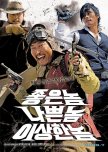
I don't think this is a movie you watch for your expected, straight-up sensible plot. You watch it like you've inhaled a puff of opium in that den in the middle of nowhere. You are in for in the exotic appeal of non-stop, over-the-top, bang-bang fast guns and action.
It IS a western in the traditional sense, with your cool men with dangling cigarettes, and all the masculine flavors of cowboy boots, long leather tailcoats, the rifle spins, the tumbleweeds in the dust, and that memorable spaghetti music. Makes you want to strike a pose for a Marlboro ad.
Yet, pinch yourself - you are in a desert of Manchuria, not Idaho, and this is a time when Imperial Japan invaded and ruled over vast territories of Korea and China. Get on the railroad and you do not know who or what is sitting next to you. The gibberish sounds a little like formal Mandarin, but mutates into loose Korean, then intruded by the smuggish Japanese before turning into a chorus of whatever else (mongolian?) happens to be.
Then there is the violence. You cannot forget the knives and daggers cutting into those sensitive areas of the human body.
Brutish, check. Chaotic, check. Lawless, check. Once upon a time in the East. Nice.
Was this review helpful to you?
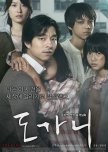
However, I've since found that the film was the filmmakers' quest for justice based on a real-life example, known as the Gwangju Inhwa School. This whole sordid episode had been written up as a novel of the same title and the film took on the role of loudspeaker to the public. Indeed, the impact of the film on Korean society was like an invisible hand that pushed through reform for regulations that gave rise to ugly events and people showcased in the film.
But the film's also like a mercury needle probing under the skin of society for saturated poison, and behold! found a dark, disgusting wound. The easy answer would be to punish the most apparent perpetrators, then live and forget, live and forget as if something alas has been done -- although truth be told, the real story was more staggering, involving more faculty and administrators, with the history of the school connecting to the crème de la crème of the community, over the span of countless more years.
At the core of it, this film is testimony to the sheer abundance of poverty and its effects on a nameless town or community. If our general mentality is the NIMBY ("not in my backyard") approach, and there is present a sizable class of those unwanted, neglected, and absolutely vulnerable, who ultimately pays the price? Let the question be better phrased - do you care where the garbage goes after it's been picked up?
The film is a mirror on society, offering us a pitiful look at the grotesqueries of our nature. It's not the first, and will not be the last, since recently I found another novel - in the US - that seemed to have been cut from the same cloth: The Nickel Boys by Colson Whitehead.
Was this review helpful to you?
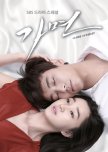
It has nothing to do with the actors, who are doing their best. They work hard, I get it.
Why are many female leads such sorry wusses? There's more attention paid to ornament their bodies than their brains. I see the beautiful outfits, the perfectly coordinated accessories, the hair, the flawless skin, etc., but I also see the deficiency in capturing them with traits that respect them as human beings, capable of myriad thoughts that allow viewers (especially the female ones) to appreciate the kinds of effects they have on the rich and powerful men around them. If you bring down the woman by limiting her agency, you bring down the men who eventually fall under her love spell.
At first, I thought the female lead would learn to mask herself, assume a new identity, contemplate how to use her role to revenge against the loan shark and his minions, and the brother in law who forces her into his twisted predicaments against her will, and take advantage of her role to elevate the financial status if not honor of her family (overtly or covertly.) Maybe somewhere along the way, she begins to confuse her new identity with the old as she struggles to accept her husband through the contract marriage even as she slowly falls undeniably in love with him. Maybe for his part, he sees her as perfectly dislikable in the beginning, yet through intimate moments is compelled to discovery aspects of her hidden self which draw him in, deeper and deeper, into the truth about who he has actually married. This, as a plot, would have been interesting.
Instead, you have a woman who cannot think rationally, who cannot keep her actions consistent, who cannot differentiate the line between doing no harm and defending herself, whose first impulse is to sob, and sob, and what else, sob. If she gets high on emotion, she becomes an instant loose cannon, totally unpredictable and uncontrollable. This is the type of person our supposedly intelligent villain and equally enviable hero are obsessed with for the whole of the drama.
The drama is actually not that different from Goong (maybe that's why JJH was the male lead.) The character of the female lead in both dramas is weak and ineffectual, but hey, at least she is dressed like a barbie.
Was this review helpful to you?




